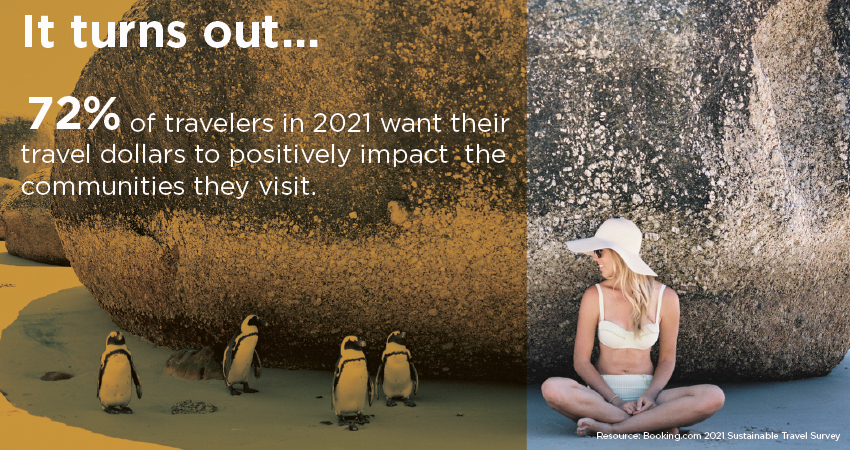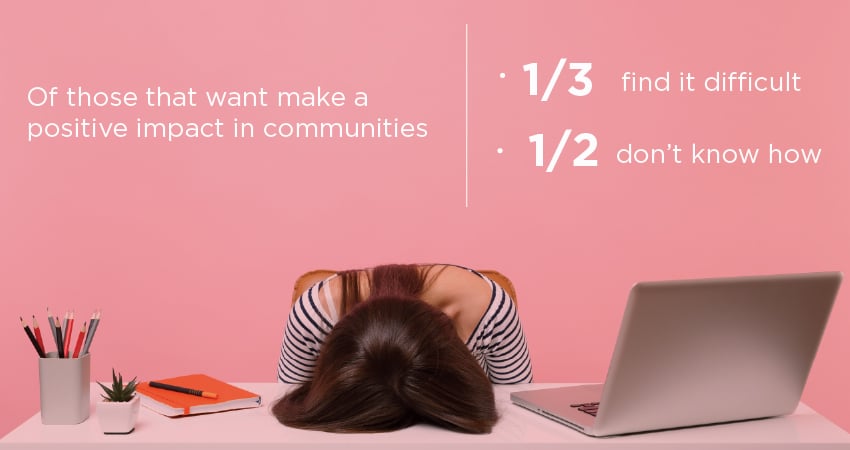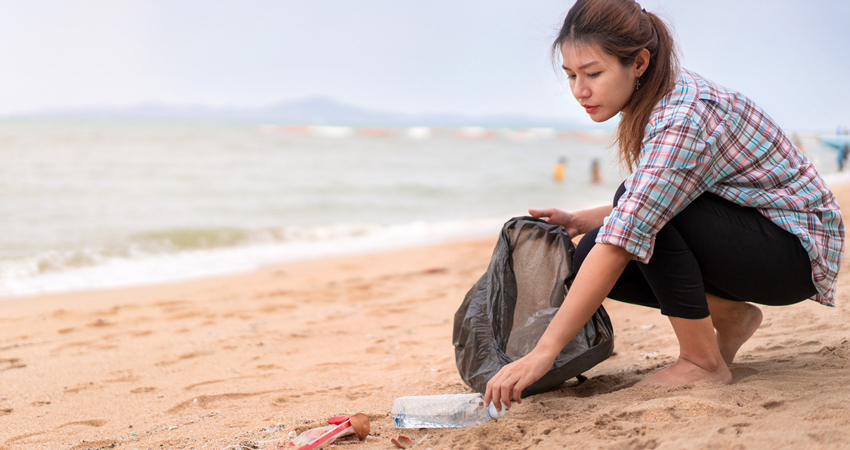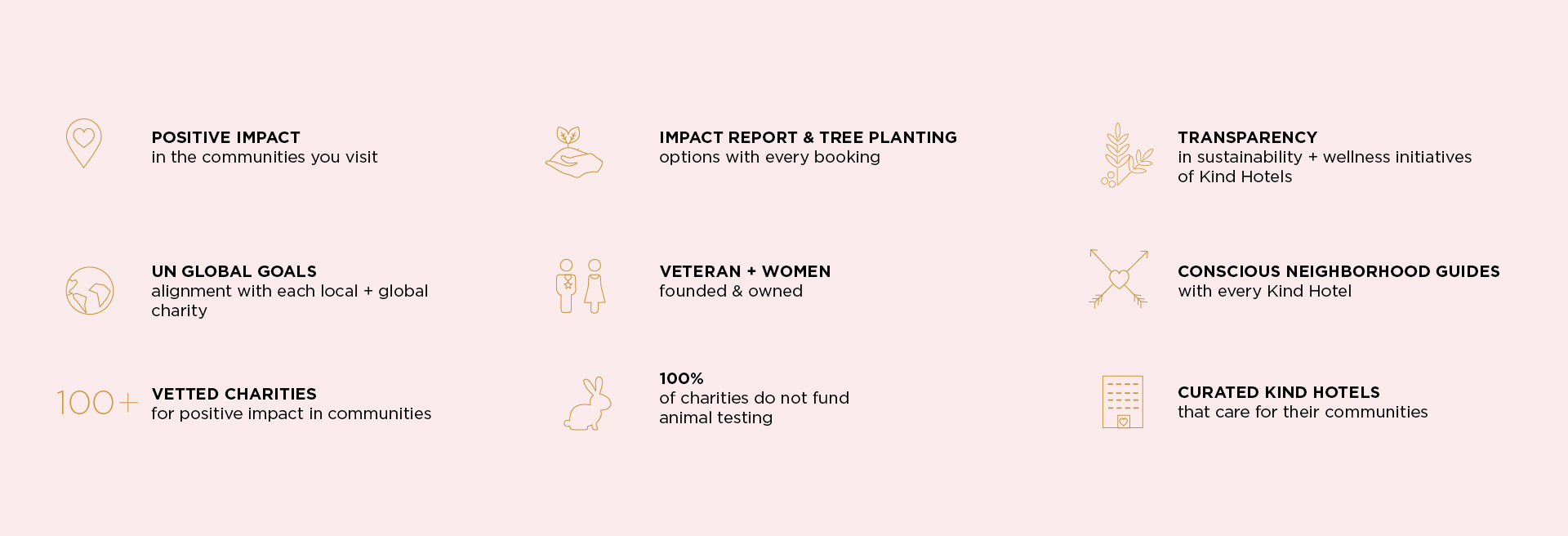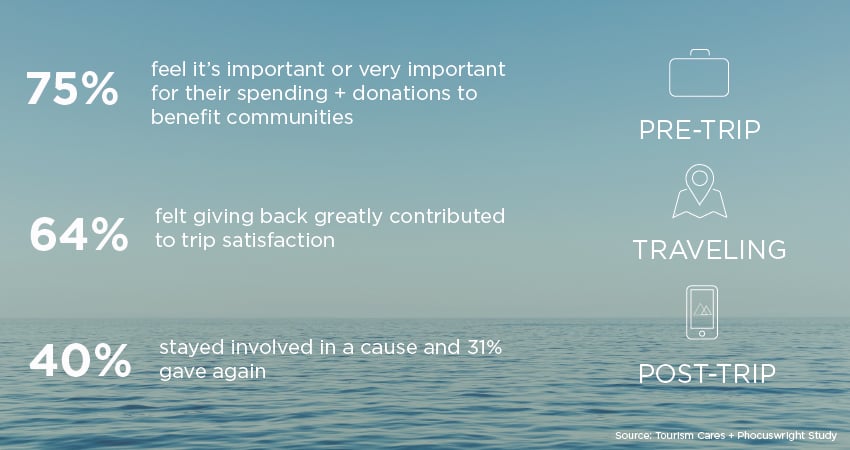Why Us?
However, only $5 of every $100 spent from international travelers in developing countries stays in the community visited (Source: UNWTO).
EMPOWERING DESTINATION STEWARDSHIP
Kind Traveler makes it easy for travelers to positively impact local communities through giving back to vetted charities dedicated to the wellbeing of destinations.
IMPACT TOURISM FOR POSITIVE IMPACT
Kind Traveler mobilizes positive impact in communities through its Give + Get hotel booking platform. Our impact model to advance sustainable tourism principles is simple: Travelers unlock exclusive rates and perks upon a minimum of a $10 donation to a locally vetted charity, or to a charity of choice. 100% of donations go to charity and every donation includes specific impact metrics to demonstrate exactly how donations impact communities. All charities must be aligned with at least one UN Global Goal for Sustainable Development. Kind Traveler also creates transparency with hotels and charities in communicating the Kind Factors of every Kind Hotel in how they are advancing environmental sustainability, community impact, and individual wellness.
Impact tourism is defined by the Center for Responsible Travel (CREST) in the CREST Impact Tourism Handbook as tourism that makes strategic contributions of time, talent, and treasure to social and environmental projects in destinations. This includes tourism businesses, travelers, and organizations in partnerships with host communities.
CREST shares: "Impact tourism is not about impulse giving or collecting loose change for charities without further touchpoints. Rather, it is about generating, in an organized and strategic manner, tourism company and visitor support for local community projects through true partnerships. It is also about integrating impact tourism into the core experience of responsible travel to ensure healthy communities are the basis for a healthy tourism sector."
WHY SHOULD YOU CARE? WHY NOW?
Covid-19 decimated non-profit organizations that relied on charitable donations as people had to brace for the unknown. Kind Traveler is well positioned to accelerate recovery and mobilize positive impact for the 1.4B travelers who took trips pre-Covid-19. Travel and tourism, a $10T GDP industry pre-Covid-19, employing 1 out of every 10 people worldwide, has enormous economic potential to drive positive community and environmental impact when managed sustainably and responsibly.
- Covid-19 impact: 97% of charities that depend on foot traffic, events, and other fundraising lost critical funding due to Covid-19 (Source: CAF America)
- 60 million individuals face extreme poverty because of Covid-19 (Source: World Bank). This erases all the progress made in poverty alleviation in the past three years.
- Climate crisis declared at COP26 shows the earth is in peril unless we take action now
- 1 million plant & animal species at risk of extinction (Source: UN)
GIVING BACK IS CONNECTED TO TRIP SATISFACTION
The psychological benefits of giving, whether it be through donation or volunteering, include evoking feelings of connectivity, happiness, and a greater sense of purpose (Source: Cleveland Clinic: Giving is Good for Your Health).
EXAMPLES OF POSITIVE IMPACT CREATED ON KIND TRAVELER
New as of September 2023: Explore Kind Traveler's Every Stay Gives Back community impact program designed to fund local charities advancing community & environmental impact with every guest stay with participating lodging partners, regardless of where or how you book. The program measures and tracks donations and the positive impact cultivated with live ESGB dashboards, making communicating and celebrating positive impact metrics easy. Explore the positive impact generated since the launch of Every Stay Gives Back.
ZERO HUNGER:
End hunger, achieve food security and improve nutrition and promote sustainable agriculture.
"Hunger is the leading cause of death in the world. Our planet has provided us with tremendous resources, but unequal access and inefficient handling leaves millions of people malnourished. If we promote sustainable agriculture with modern technologies and fair distribution systems, we can sustain the whole world’s population and make sure that nobody will ever suffer from hunger again." - UN Global Goals
Redwood Empire Food Bank (REFB)
Area of Impact: Santa Rosa, California
600 families in-need received nourishing meals in a region where 100,000 children, families and seniors are served each year by REFB. With demand for REFB services 69% higher than pre-pandemic levels due to inflation and supply chain bottlenecks, support for hunger relief organizations such as REFB has never been more essential.
City Harvest
Area of Impact: New York City, New York
860 pounds of food was delivered on behalf of City Harvest in NYC, where nearly 1.4 million residents are struggling with hunger, including 420,000 children – that’s more than the population of Miami! Through rescuing more than 55 million pounds of healthy food that would otherwise go to waste, City Harvest will help feed New Yorkers in need.
Feeding South Florida
Area of Impact: Miami, Florida
682 families received nutritious meals in South Florida — a region where 25% of Florida’s food insecure resides. As a member of Feeding America, the largest domestic-relief organization, Feeding South Florida is helping to end hunger by providing immediate access to nutritious food, leading poverty and advocacy efforts and transforming lives through innovative education.
CLIMATE ACTION
Take urgent action to combat climate change and its impacts.
"Climate change is a real and undeniable threat to our entire civilization. The effects are already visible and will be catastrophic unless we act now. Through education, innovation and adherence to our climate commitments, we can make the necessary changes to protect the planet. These changes also provide huge opportunities to modernize our infrastructure which will create new jobs and promote greater prosperity across the globe." - UN Global Goals
Arbor Day Foundation & One Tree Planted
Area of Impact: National (U.S.)
470 trees were planted in U.S. forests affected by disease and wildfires. Healthy trees cool the planet by absorbing and storing harmful particulate pollutants and GHGs — in fact, a mature tree can absorb an average of 22lbs of CO2 per year. Planting trees can increase the resilience of ecosystems, help minimize climate change effects, and buy people and governments time to adapt to changing conditions. Planting native seedlings in ecologically appropriate areas can also counteract soil and biodiversity loss and improve human well-being.
Sonoma Land Trust
Area of Impact: Santa Rosa, California (Sonoma County)
38 miles of hiking trails were maintained, helping to preserve one of the most beautiful and biologically diverse counties in the U.S. By developing long-term land protection strategies, Sonoma Land Trust has protected 50,000 acres of beautiful, productive, and environmentally significant land through the county.
Russian Riverkeeper
Area of Impact: Healdsburg & Sonoma County, California
7,500 pounds of trash was removed from the Russian River helping to serve communities by restoring and sustaining the health of this precious natural resource. The focus with Russian Riverkeeper is regenerating the health of the Russian River and its wildlife by restoring more than 80% of river and wetland areas lost over the last 100 years to mining, agricultural and urban development.
Global Green
National (U.S.)
162 individuals in underserved communities received tool sets for a compost bin. Composting helps keep vegetable matter out of landfills where methane gas is created as the plant matter decays in an airless environment. This potent greenhouse gas is 21 more times more potent than carbon dioxide. By composting, we can minimize landfills’ contribution to climate change.
LIFE BELOW WATER
Global Goal 14: Conserve and sustainably use the oceans, seas, and marine resources for sustainable development.
'Healthy oceans and seas are essential to our existence.They cover 70 percent of our planet and we rely on them for food, energy and water. Yet, we have managed to do tremendous damage to these precious resources. We must protect them by eliminating pollution and overfishing and immediately start to responsibly manage and protect all marine life around the world." - UN Global Goals
Manta Trust
Area of Impact: Maldives
10 Maldivian children went on a snorkeling excursion with manta rays, inspiring local conservation efforts. With the largest brain of all fish, the intelligence and curiosity of manta and devil rays make them one of the most charismatic creatures in the world. Unfortunately, targeted and bycatch fisheries have had devastating impacts on their population around the globe. While the Maldives currently contain the largest population of manta rays, they are some of the most threatened fish in our seas. Through research, collaboration and education, Manta Trust advances conservation efforts with more than 20 projects worldwide.
Marine Mammal Care Center LA & Pacific Marine Mammal Center
Area of Impact: Los Angeles & Laguna Beach
600 injured or sick marine mammals – particularly seals and sea lions – received care on the coasts of Los Angeles and Laguna Beach. Marine mammals are increasingly threatened by damage to their environments (plastic, fishing lines, and cigarette butts are some of the main culprits), facing illness and injury from humans. Through rehabilitation and release programs and educational programs designed to increase public awareness on environmental issues and research, both organizations are creating a healthier eco-system.
LIFE ON LAND | ANIMAL WELFARE | HEALTHY COMMUNITIES
From farm animals to domestic animals and wildlife, Kind Traveler believes all animals should be treated with kindness, respect and empathy -- and our not ours for entertainment. While animal welfare is not a specific goal of the UN Global Goals, the role of healthy animals and the humane treatment of them, play an essential role in creating healthy communities, a key component of both the Global Goals and sustainable tourism principles.
Kind Traveler also advocates for the movement and support of plant-forward lifestyles. Plant-forward lifestyles not only consider the human health benefits and the moral and ethical realities of animal suffering connected to factory farming, but also recognize that such lifestyles are connecting to the reduction of harmful greenhouse gases connecting to our warming planet. Read more on our blog about How a Plant-Based Lifestyle Fights Climate Change.
Lastly, when it comes to animal attractions and animals in entertainment, 550,000 wild animals are currently enduring lifetimes of suffering at tourist entertainment venues globally. Activities such as riding elephants, taking photos with tigers, lion walks and dolphin performances are examples of popular tourist attractions that can cause lifelong trauma for wild animals.
"A flourishing life on land is the foundation for our life on this planet.We are all part of the planet’s ecosystem and we have caused severe damage to it through deforestation, loss of natural habitats and land degradation. Promoting a sustainable use of our ecosystems and preserving biodiversity is not a cause. It is the key to our own survival.” - UN Global Goals
Animal Defenders International
Area of Impact: International
17 rescued animals received care as part of ADI’s undercover investigations helping to end animal suffering. ADI has a worldwide reputation for undercover investigations gathering video and photographic evidence behind the scenes in difficult circumstances. Such evidence from investigations with scientific, economic, and legal reports, help to secure progressive animal protection legislation, helping to enforce laws secured. ADI has secured rules on the cross-border movements of endangered species in traveling exhibitions in over 170 countries; 33 countries have passed bans on animals in circuses; and European laws have been secured ending cosmetic testing on animals
Gentle Barn
Area of Impact: Santa Clarita, California
29 rescued farm animals received care with Gentle Barn, a safe haven and place of recovery for severely abused animals and children. Through interaction with rescued animals, abused children recovering from substance abuse, kids on probation, foster kids, and children and adults with mental, emotional, and physical challenges, learn forgiveness, courage, strength, trust, empathy, and kindness. Since 1999, Gentle Barn has rescued thousands of animals and hosted more than 400,000 children.
spcaLA
Area of Impact: Los Angeles
258 rescued kittens were provided with bedding to support adoption efforts of homeless animals in Los Angeles. When public shelters are full, they have no choice but to euthanize even adoptable animals to make space for those incoming. Public shelters rely on spcaLA and other private shelters or rescue groups to take in adoptable animals and keep their population low enough to avoid euthanizing. spcaLA offers various programs promoting kindness including a Humane Education program to decrease animal cruelty, a shelter equipped with medical care and adoption services and more – because all living creatures deserve to be loved.
Each year, approximately 920,000 shelter animals are euthanized each year in U.S. shelters.

